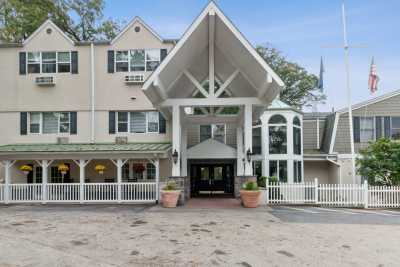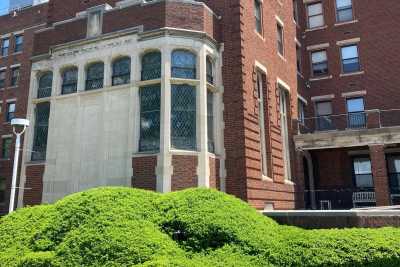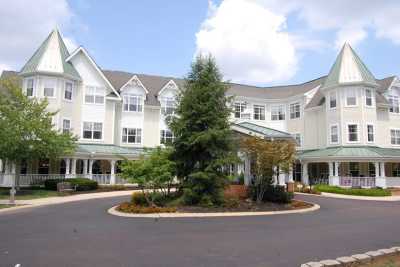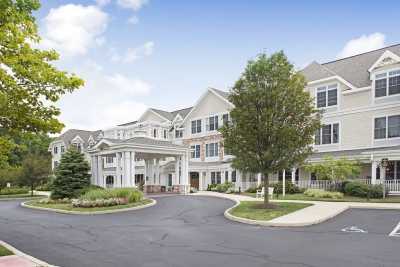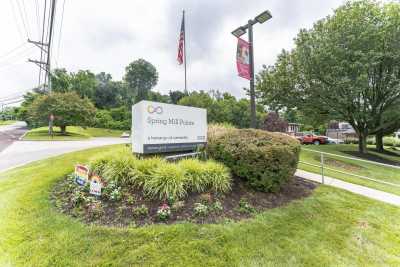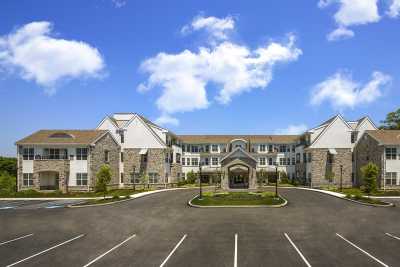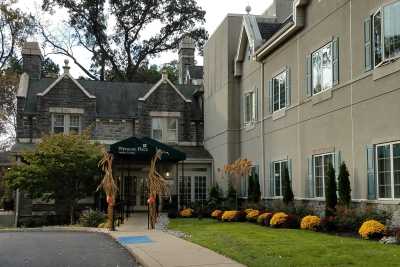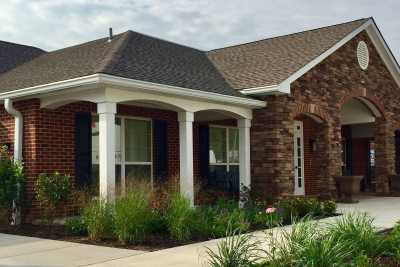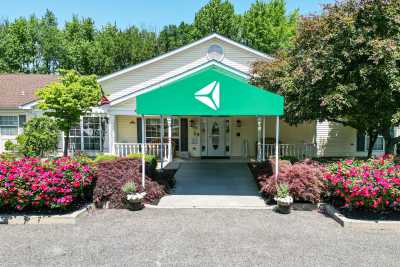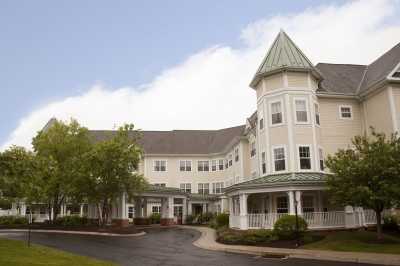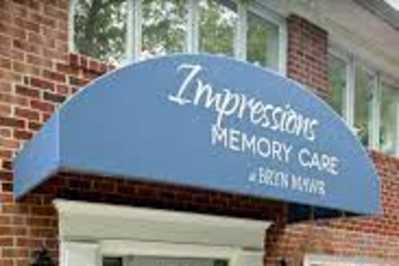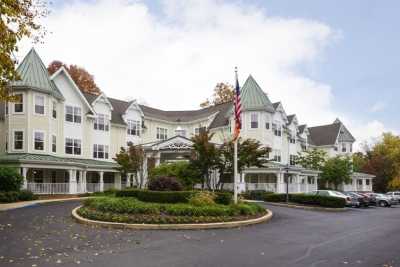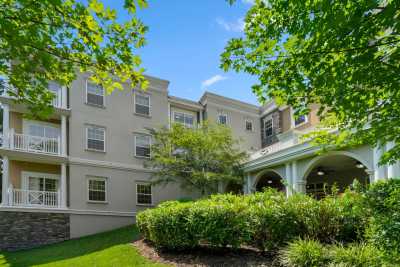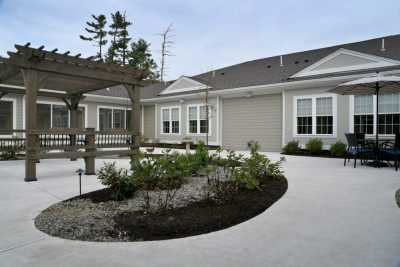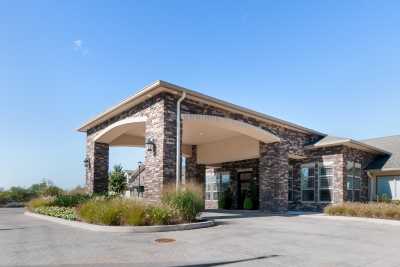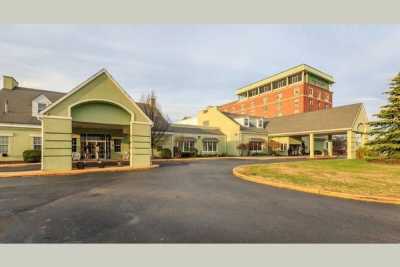
For many families, a memory care facility is the best option to make sure their loved one has access to round-the-clock care and supervision, as well as specialized therapies and programs. A Place for Mom partners with 27 memory care facilities within a 10-mile radius of the Center City District in Philadelphia, which includes Camden and Burlington in neighboring New Jersey. The majority of our partnered Philadelphia memory care facilities are secured communities with specially trained staff equipped to handle exit-seeking behaviors and wandering.
Philadelphia — also known as Philly and the City of Brotherly Love — is known for its larger-than-life culture, sensational food scene, and famed historic sites. It also boasts access to some of the top hospitals in the country, a booming public transit system, and an array of inclusive activities for people of all ages and abilities. We’ve designed this guide to help families at any stage of their memory care journey. You’ll find a collection of proprietary data from our partner Philadelphia memory care facilities that details specific community costs, amenities, and services. We’ll also give you a rundown of the different types of memory care, Philadelphia highlights for seniors, and Pennsylvania’s laws and regulations for memory care facilities.
10 Best Memory Care Facilities in Philadelphia, PA
For many families, a memory care facility is the best option to make sure their loved one has access to round-the-clock care and supervision, as well as specialized therapies and programs. A Place for Mom partners with 27 memory care facilities within a 10-mile radius of the Center City District in Philadelphia, which includes Camden and Burlington in neighboring New Jersey. The majority of our partnered Philadelphia memory care facilities are secured communities with specially trained staff equipped to handle exit-seeking behaviors and wandering.Read more
Philadelphia — also known as Philly and the City of Brotherly Love — is known for its larger-than-life culture, sensational food scene, and famed historic sites. It also boasts access to some of the top hospitals in the country, a booming public transit system, and an array of inclusive activities for people of all ages and abilities. We’ve designed this guide to help families at any stage of their memory care journey. You’ll find a collection of proprietary data from our partner Philadelphia memory care facilities that details specific community costs, amenities, and services. We’ll also give you a rundown of the different types of memory care, Philadelphia highlights for seniors, and Pennsylvania’s laws and regulations for memory care facilities.
Philadelphia Memory Care Facilities | 934 Reviews
The people are amazing & do an amazing job taking care of my uncle! Wesley Enhanced Living at Stapeley is really nice, Professional staff. Personable, everyone knew my uncle by name. Classy building with...
Best decision I could have made was moving here. There is so much going on day to day that there is always something to do. The new dining room is beautiful and the food is excellent. Everything a person...
I would give a 5 for all of the above, they are wonderful. They are truly caring, helpful and kind. I would most definitely recommend Atria Center City to others.
Please be aware that my Father is not currently living at the Terrace hoping he will start living there in November. However, based on the first impression we had - The staff and residents actually talking...
There could be more variety in activities for residents. There could be a more healthful menu. There could be more variety in menu. It's ok. It seemed a little different when we visited than what it seems...
My husband and I are residents at Simpson House. The facility is spotless. The services offered with the residents, such as linen service and housekeeping, are excellent. The fact that this is a non-profit...
Need to have a choice for people that don’t eat meat . lol but other than that It was good. Staff very friendly and nice. Very good music!!!!!! everybody sweaters look pretty everybody was dressed up really...
My mother loves living here! The staff from the front line workers right up to the ED are all so helpful and compassionate. The environment is clean, and there are always great activities to enrich residents...
The facility and staff is always very prompt, helpful and polite. My mom started off as independent living and has recently been moved up to personal care. My mom's room is a nice size and she has a...
My parents are starting week 7 and are really settling in very comfortably. Crescent Fields representatives were excellent to deal with as well.
Our free advisors can help
- Compare local facilities
- Determine care type
- Schedule tours
- Evaluate pricing
Everyone was extremely friendly and courteous . The only negative point was whether it was an accounting question or the nurse getting back to me regarding general questions was a little slow and took...
My wife has fit right in and seems happy. I couldn't ask for more. It has great attitude, very capable staff, very clean, good services, and anything you think your loved one would need.
The facility is nicely laid out. Residents have plenty of opportunities to change their environment if they want without getting lost. All the management staff know all the residents by name and assist...
Arden Courts A ProMedica Memory Care Community in Cherry Hill
2700 Chapel Ave W, Cherry Hill, NJ 08002There have been a few minor issues that we are still working on. They do a very good job keeping the place clean and odor free. The people I've met are all wonderful. Quality of care - this is one of the...
Everyone I've met so far has been very helpful and very nice. They've allowed me to bring my dog as long as she's up-to-date on all of her shots. Part of our monthly bill includes the continental breakfast,...
Everyone at The Hearth at Drexel community has been very attentive to our loved ones needs. Based on the experience we have had so far, we would recommend this community to other families.
[name removed], the nurse administrator, is amazingly knowledgeable, nurturing, and approachable. [name removed], one of the staff nurses is very loving and patient. The whole staff has been wonderful!
I think what sticks out most about Premier Cadbury is the friendliness of everyone. They were very welcoming and caring. The facility is a little dated, but it is overall a very nice place.
Sunrise Haverford is a unique, caring community. My father was a resident in personal care and was quite ill when he moved to the community. I can tell you that every person at Sunrise treated him with...
There are lots of experienced people with varied personalities. Everyone's families needs will be different. I believe that the staff will do their best to meet those needs. The food seems tasty. My mom has...
I can say, with confidence, that this facility is a 5 in all categories. We looked at numerous communities and found this one to be the best fit for our loved one. It has changed ownership recently (now...
They were pleasant, professional. They could answer questions and if they did not know they answer, they found someone that could answer the question. I would highly recommend Springfield Senior Living.
As of right now Mom is doing well there. The transitions was difficult but she has adjusted. Her medical needs are being met to the best of my knowledge and she has friends there too.
It has been such a pleasure working with the ladies who run 'The Residence'. I am helping my dad and step-mother and have needed lots of guidance...and, while i can't see the property until it's completed, i...
My aunt has had the same nurse for two years. Staff is so important. Consistency of care at this place is the best I’ve seen. Now, I see the facility is getting the overdue attention that it has needed for a...
- Costs of memory care in the Philadelphia area
- How people pay for memory care in Philadelphia, PA
- Understand Pennsylvania laws and regulations for memory care facilities
- Get to know memory care in Philadelphia
- What to expect from memory care communities in Philadelphia
- Explore senior care with confidence
- Unfamiliar with Philadelphia? Highlights for seniors
Costs of memory care in the Philadelphia area
With an average monthly cost of $5,500 at our partner communities in Philadelphia during 2022, memory care facilities tend to be more expensive than assisted living and independent living communities[01], as residents in memory care have more extensive care needs that may require the following:
- Extra security and monitoring
- Dementia-specific activities and programs
- 24-hour awake staff
Some communities may include all those services along with amenities, like meals and snacks, on-site transportation, and housekeeping, in a flat monthly rate. The $5,500 average represents the cost of a memory care facility as well as care and amenities, including any optional services or fees, such as the following:
- Monthly pet fees
- Community fees
- Medication management and/or administration
You may find some communities begin their pricing with a baseline rate and add any extra costs for services, fees, and amenities to the monthly price. You can take a look at the starting costs of memory care in the broader Philadelphia area here:
Average cost comparisons near Philadelphia, PA
Average monthly costs
Philadelphia, PA
How people pay for memory care in Philadelphia, PA
The costs of memory care can weigh heavily on the minds of loved ones, with many families wondering if they have enough saved to pay for it long-term.
For some families, relying solely on private funds to pay for memory care is out of the question. Fortunately, several resources can provide some financial support for memory care costs. We delve into the assortment of payment options and resources for memory care from private and public pay options to veterans benefits.
When assessing how to pay for memory care, many families begin by sizing up their private funds and assets. Personal savings accounts and retirement income can contribute significantly to memory care costs for some, and others may also be able to utilize investment returns from any stocks or bonds.
Retirement income, in particular, can actually go a long way for Pennsylvania seniors. Retirement income from sources such as pensions, Social Security income, and withdrawals from IRAs and 401(k)s are tax exempt for most senior Pennsylvania residents who are eligible to retire.[02]
Some retirement income for New Jersey residents is taxable, like employee pensions, annuities, and IRA withdrawals. However, Social Security benefits, military pensions, and pensions received because of a disability before age 65 aren’t taxed.
You can also think outside the box when considering private ways to pay for memory care by utilizing resources like those listed below. Though, you’ll want to check directly with a provider or representative about using long-term care insurance and life insurance policies, as coverage and eligibility can vary on a policy-by-policy basis.
Qualified veterans and their spouses can receive financial support for memory care costs through some of the federal benefits offered by the U.S. Department of Veterans Affairs (VA). Benefits like Aid and Attendance can be a tremendous resource for veterans with limited income. This monthly monetary benefit can be used to offset living expenses and long-term care costs in a memory care facility.
While the VA system can offer tremendous benefits to veterans and families, the application process can be lengthy and convoluted. With such a large veteran population, Philadelphia has dozens of accredited veteran service organizations (VSOs) that can help seniors decode the puzzling VA system and access all the benefits they’re entitled to. Before starting your application for benefits, reach out to these experts for the best chance at receiving all the benefits to which you or your loved one is entitled.
The Pennsylvania Department of Military and Veteran Affairs (DMVA), Disabled American Veterans (DAV), and Veterans of Foreign War (VFW) are just some of the local resources that can help you get started on your benefits application. These VSOs are located in the Philadelphia Regional Office, along with the following VA-approved organizations:
- AMVETS
- Paralyzed Veterans of America
- American Legion
- United Spinal Association
New Jersey residents can also look up their local veterans service offices on the New Jersey Departments of Veterans Affairs website.
Number of veterans who live in Philadelphia
About 25% of Philadelphia veterans are age 75+
Resources for Philadelphia and New Jersey veterans
Pennsylvania Department of Military and Veterans Affairs
Phone: 215-381-3040
Disabled American Veterans (DAV)
Phone: 215-381-3065
Veterans of Foreign Wars (VFW)
Phone: 215-381-3123
AMVETS
Phone: 215-381-3294
American Legion
Phone: 215-381-2032
Paralyzed Veterans of America
Phone: 215-381-3037
United Spinal Association
Phone: 215-381-3037
Camden County VA office
Phone: 856-853-4184
Burlington County VA office
Phone: 609-518-2273
Many families turn to Pennsylvania’s Medicaid program — Medical Assistance (MA) — once their private funds have been exhausted. To qualify, applicants must meet MA’s income and resource limits, as well as the following eligibility requirements:
- Seniors must provide a Social Security number.
- Seniors must meet household composition requirements.
- Seniors must have proof of identification like a driver’s license or passport.
- Seniors must establish residency and citizenship.
MA doesn’t fully cover the cost of a memory care facility, but some services may be taken care of through the Community HealthChoices (CHC) waiver.
Community HealthChoices (CHC) waiver
The Community HealthChoices (CHC) waiver is designed to help qualified seniors and disabled adults who need a nursing home level of care. This waiver program helps avoid nursing home placement by offering access to long-term care services from the community. Eligible recipients must meet the following criteria:
- Be age 65+ (or 21 and older with a disability)
- Need a nursing home level of care
- Be dually eligible for Medicare and Medicaid[04]
While a CHC doesn’t take care of room and board expenses, it has several services and benefits that can be covered in a memory care facility. Some of the long-term services include the following:
- Cognitive rehabilitation therapy
- Adult daily living services
- Behavior therapy
- Community transition services
- Personal emergency response services (PERS)[05]
You or your loved one can apply for MA and other benefits online using the COMPASS website or by calling 866-550-4355. In-person applications can also be submitted at the local County Assistance Office (CAO), where trained staff can help your loved one complete the form and walk you and your loved one through MA eligibility and waiver programs.
New Jersey residents or someone considering a memory care facility in neighboring New Jersey may be able to benefit from New Jersey’s Medicaid program. Eligible seniors could get help paying for long-term care services provided in a memory care facility through the NJ FamilyCare Aged, Blind, Disabled Program.
Other local organizations are also available to help with the complex processes of Medicaid. The Community Legal Services of Philadelphia can help seniors who were denied Medicaid services or whose eligibility for Long-Term Services and Supports (LTSS) was terminated. The Pennsylvania Health Law Project is a nonprofit legal service that also helps senior clients access Medicaid benefits and resolves any eligibility problems.
Philadelphia resident Medicaid resources
Pennsylvania Department of Human Services
Find your local County Assistance Office (CAO).
Community Legal Services (CLS) of Philadelphia
Contact CLS.
Phone: 215-981-3700
Pennsylvania Health Law Project (PHLP)
Get legal help.
Phone: 800-274-3258
New Jersey Medicaid
Phone: 800-701-0710
Pennsylvania Department of Human Services
Medical Assistance Eligibility Handbook
For the most part, Medicare doesn’t chip in for the cost of a memory care facility in Philadelphia. Specifically, Medicare won’t pay for room and board expenses or any custodial care provided in a memory care facility, such as assistance with activities of daily living.
Some memory care-specific costs and services may be covered by Medicare for seniors age 65 and older with Alzheimer’s or other types of dementia. These services include the following:
- Cognitive assessments, which can flag early signs of dementia and confirm a diagnosis
- Medications, which can help delay the progression of Alzheimer’s and other types of dementia
- Care planning, which guides patients to medical and nonmedical support like alternative treatments and community resources[06]
Additionally, Medicare also pays for some short-term health care services. Some of these approved short-term health expenses include preventative services like screenings and vaccines, as well as the following:
- Skilled nursing care
- Durable medical equipment (DME)
- Hospice care
- Inpatient hospital stay[07]
Help with Medicare
Philadelphia seniors have access to several resources to help maneuver through the ins and outs of Medicare. The Pennsylvania Medicare Education and Decision Insight (PA MEDI) has insurance and benefits counseling services for Medicare-eligible seniors. From questions about eligibility and enrollment to applying for different Medicare plans, PA MEDI’s trained counselors are available to help seniors find the best coverage for their needs. New Jersey residents can access free Medicare counseling by contacting the NJ Medicare Information and Referral Service.
The Philadelphia Corporation for Aging (PCA) partners with two organizations in Philadelphia to provide ombudsman services to seniors. Ombudsmen advocate for seniors living in a long-term care setting and handle complaints from residents and their families. They also provide services related to seniors’ finances, which include accessing Medicare and Medicaid benefits and billing-related issues. New Jersey also has an ombudsman program for senior residents living in long-term care facilities.
Medicare resources
Philadelphia Corporation of Aging (PCA)
Ombudsman program
642 N. Broad St.
Wallace Building
Philadelphia, PA 19130-3049
Phone: 215-765-9000
Pennsylvania Medicare Education and Decision Insight (PA MEDI)
Find your local Area Agency on Aging.
Phone: 800-783-7067
New Jersey long-term care ombudsman
Phone: 877-582-6995
New Jersey Medicare Information and Referral Service
Phone: 800-792-8820
Understand Pennsylvania laws and regulations for memory care facilities
The Pennsylvania Department of Human Services is in charge of regulating memory care-only communities, as well as assisted living communities — also called personal care homes in Pennsylvania — with dementia care units. These dementia care units are defined as a secured area of an assisted living community with memory care programs and services for residents with Alzheimer’s and other types of dementia.[08]
Annual inspections are done by the department to make sure personal care homes are in line with the regulations set at the state level. You can find annual reports about licensed personal care homes in Pennsylvania on the Department of Human Services website. We break down some distinct regulations for dementia care units below, but you can access all regulations for personal care homes published online by the Pennsylvania Code and Bulletin.
New Jersey memory care facilities are regulated and licensed by the Department of Health (DOH). Like Philadelphia memory care facilities, those in New Jersey have specific policies in place for areas like medication managements, facility accommodations, and resident admission. While the regulations outlined below focus on Philadelphia memory care facilities, you can find a full list of state rules for New Jersey memory care communities in the State Operations Manual. You can also file complaints online and look up facilities with violations issued against them.
Admission and resident transfer
Personal care homes have a few pre-admission screenings to make sure a facility is equipped to meet the care needs of each resident. Most personal care homes generally won’t accept people who need a higher level of care, such as round-the-clock skilled nursing or a ventilator.
Before admission to a secured dementia unit, a physician or other licensed health care professional must complete a written medical assessment that determines the potential resident’s dementia diagnosis and need for admission to memory care. This must be provided to a facility within 60 days of admission.
All memory care facilities and personal care homes that transfer a resident must give a 30-day advance notice and detail the reasons behind the release. The following instances warrant a resident transfer from a memory care facility:
- A resident is a threat to themselves or others.
- Payments haven’t been made.
- A portion of the community has closed down.
- A resident’s needs can no longer be met in the community.[08]
Facility requirements
Memory care facilities in Philadelphia are required to provide adequate living spaces for residents. No more than two residents can share one bedroom, and all memory care facilities must provide common areas that include the following:
- Dining spaces
- Indoor and outdoor exercise areas
- Spaces for individual and group activities[08]
All secured dementia areas also have to disclose all procedures taken to heighten environmental awareness and reinforce residents’ independence.
Resident care
Memory care residents in a secured dementia unit must undergo a pre-admission cognitive screening within 72 hours of admission and be evaluated annually to determine the need for memory care and to develop a support plan that meets the following criteria:
- The support plan is updated annually to address any changes to a resident’s condition.
- The support plan identifies a resident’s physical, medical, social, cognitive, and safety needs.
- The support plan determines a designated person to be involved.[08]
Security
Memory care facilities often have enhanced security measures in place, and nearly 50% of our partner communities in Philadelphia have some type of system to prevent wandering.[01] Secured dementia units must have approval to equip doors with locking devices and other security systems that deter unexpected exits. All memory care facilities must have a statement that confirms any locking system will shut down in the event of any of the following situations occurring:
- A power outage
- A system override through a keypad or other device
- An activated fire alarm, heat system, or smoke detector[08]
Any door that opens into potentially unsafe areas, such as a parking lot, needs to be locked by an electronic or magnetic system. All locking systems and devices within a facility must have operating instructions posted discreetly by the device. Additionally, all secured dementia units must have an approved 24-hour monitoring service or a fire alarm system that’s connected to the local fire department.
Programs
Secured memory care units are required to offer activities that consider a resident’s age and cognitive level. The activities should also help seniors preserve their current abilities. Memory care facilities should coordinate a variety of programs every week and may include the following:
- Arts and crafts
- Self-care activities
- Walking, gardening, and other outdoor hobbies
- Dancing, stretching, and other gross motor activities
- Games, music, and community festivities
- Sensory and memory enhancement activities
Staff training
All direct care staff members are required to complete an orientation on fire safety and emergency preparedness before their first day. Within the first 40-hour work week, direct care staff must also complete orientation on these topics:
- Resident rights
- Emergency medical plan
- Reportable incidents and conditions
- Mandatory documenting of abuse and neglect[08]
They must also finish 12 hours of annual training on topics relating to their specific job duties, such as personal care services and infection control. Additional initial training must be completed by direct care staff before they can provide any unsupervised activities of daily living (ADL) services, which covers subjects listed below:
- Personal hygiene
- Safety management techniques
- ADLs and instrumental ADLs
- Universal precautions[08]
Direct care staff is also required to receive annual training on procedures such as fire safety, fall and accident prevention, and resident rights. Staff members who work in a secured dementia care unit must also undergo an annual 6 hours of dementia-specific training.
COVID-19 regulations for Philadelphia memory care facilities
Many senior living and memory care facilities will have COVID-19 measures that align with those set at state and local levels. Some memory care facilities may choose to adopt firmer methods to prevent infection among residents and staff than what the local guidance calls for.
It’s generally best practice to reach out to a community directly about their current safety measures, given how rapidly COVID-19 and its variants continue to evolve. The Department of Public Health has been at the forefront of Philadelphia’s COVID-19 response, and you can find the latest COVID-19 updates and community resources on its website.

Masking. Masks may be required in public areas of memory care facilities with surges in COVID-19 cases.

Facility cleanliness. Many facilities continue to practice enhanced cleaning methods to disinfect highly touched surfaces.

Staff safety. A lot of memory care facilities continue to provide ongoing testing and temperature checks for staff.

Social distancing. Many memory care facilities encourage visits to be small in size and take place in residents’ rooms to promote social distancing.
Get to know memory care in Philadelphia
6500
81
What to expect from memory care communities in Philadelphia
Around 25% of our partner communities exclusively offer memory care services to residents with Alzheimer’s and other types of dementia, while the majority are located within a senior community that also offers assisted or independent living.[01] We detail a brief description of what you can expect to find at Philadelphia and neighboring Camden and Burlington, New Jersey, memory care facilities below.
Inviting spaces
From modern bliss to residential elegance, memory care communities in Philadelphia come in many shapes and sizes. Some memory care communities welcome residents and guests with contemporary design elements and skyline views, while others take a more traditional approach with homelike features and common areas bathed in natural light. Outdoor spaces at many memory care communities are equally remarkable with vibrant landscaping, walking paths, and raised garden beds.
Philadelphia memory care units come in a variety of floor plans that consist of private and semi-private living options. Some communities feature lavish interior upgrades like granite countertops and kitchenettes. Many memory care units come equipped with accessible showers and grab bars in the bathroom. Nearly all memory care units feature individual air conditioning systems, and several communities provide a round-the-clock emergency call system and cable TV in units.
Dementia-specific programs and social activities
About 90% of our in-network memory care facilities have an on-site activity director who coordinates diverse social programs for residents to participate in. Many communities offer programs tailored to residents with Alzheimer’s and other types of dementia. Reminiscence and sensory-based programs are provided at 63% of our in-network Philadelphia memory care communities. These programs specifically are designed to evoke positive memories and help memory care residents express themselves.
Other activities encourage memory care residents to socialize with others and participate in activities they enjoy. Several of our in-network communities plan art and cooking classes, educational workshops, and live musical performances. Most of our in-market communities also plan activities that promote the use of gross motor skills like tai chi, yoga, and stretching classes.
Helpful amenities and services
On top of the 24-hour awake staff available at memory care communities, several of our in-network memory care facilities have access to on-site care. Nearly 90% of our partner Philadelphia memory care facilities have on-site rehabilitative therapies and access to visiting physical, speech, and occupational therapists. Many partner communities have on-site nursing and about 33% have an on-site skilled nursing facility. Additionally, almost 75% have a visiting nurse and on-call doctor available.[01]
Memory care facilities aren’t limited to health-related services, and many offer an array of amenities designed to help make residents’ lives simpler and more comfortable. Nearly all of our in-network communities provide housekeeping and personal laundry, as well as transportation services. Most Philadelphia memory care communities serve restaurant-style dining, and several of our in-network communities have a professional chef available.
Explore senior care with confidence

Know where to start.
Identify the right care for your loved one with our free assessment.

See what you can afford.
Understand cost and payment for long-term care based on your loved one's needs.

Find top facilities for you.
Free, personalized guidance from our Senior Living Advisors can help you narrow your search.

Tour your favorite facilities.
Our free touring checklist can help you choose the right community.
Unfamiliar with Philadelphia? Highlights for seniors
226700
Number of seniors aged 65 and older currently living in Philadelphia
Percentage of seniors 65 and older within the Philadelphia population
Percentage of Philadelphia seniors 65+ with a disability
Health care for seniors in Philadelphia
Access to top-notch medical care is widely available in Philadelphia with more than 60 hospitals located in and around the city.[11] Several of Philadelphia’s hospitals rank among the best in the country for specialties that include neurology and neurosurgery.

Hospitals of the University of Pennsylvania-Penn Presbyterian — Penn Medicine
Penn Medicine consistently ranks as one of the best hospitals in the country with world-class patient care and breakthrough treatments and therapies. This acute care hospital also serves as an academic hospital, which means patients have access to the latest medical breakthroughs, clinical trials, and treatments that may not be available at other hospitals. On top of its acclaimed cardiac and cancer care, Penn Medicine ranks as the No. 15 hospital in the country and the No. 1 in Philadelphia for neurology and neurosurgery.

Jefferson Health
Jefferson Health joins the list of nationally recognized hospitals in the Greater Philadelphia area. Its renowned Sidney Kimmel Cancer Center is recognized as one of the best in the nation, and it’s a designated National Cancer Institute (NCI) Cancer Center, offering access to clinical trials and breakthrough treatments. Additionally, the Vickie and Jack Farber Institute for Neuroscience has some of the most advanced technologies and treatments available for conditions ranging from Alzheimer’s and Parkinson’s disease to Multiple Sclerosis.

Temple University Hospital
Temple Health is one of Philadelphia’s leading health systems with over 1,500 physicians and scientists. Its Fox Chase Cancer Center is an NCI-designated cancer center with elite treatment options and groundbreaking clinical trials available to help patients with all types of cancer. Temple Health also has a nationally recognized stroke program, and the Temple Neurosciences Center has some of the finest care available to treat conditions related to the brain, nerves, and spine.
Transportation for seniors in Philadelphia
In some instances, specific health and medical services aren’t provided or available in a memory care facility. On-site transportation services deliver a safe and convenient way for residents to get to and from medical appointments and other errands. Just over half of our partner memory care facilities in Philadelphia arrange transportation for residents, which includes complimentary and at-cost services.
Visiting a loved one in memory care is a breeze with Philadelphia’s impressive public transit system. The Southeastern Pennsylvania Transportation Authority (SEPTA) operates 120 bus routes throughout the Philadelphia metro, as well as the city’s high-speed rail, subway, and trolley lines. SEPTA’s Regional Rail lines will be especially advantageous for family members who travel back and forth into Philadelphia from the suburbs. There are 13 rail lines that make over 150 stops between Center City and the surrounding suburbs. Out-of-town guests can enjoy a hassle-free start to their visit by hopping aboard SEPTA’s Airport Line, which runs about every 30 minutes on weekdays and hourly on weekends.
Seniors who are 65+ travel for free on all SEPTA buses, trolleys, and subways with a SEPTA Key Senior Fare Card. This card also gives seniors free travel on SEPTA’s Regional Rail for travel within Pennsylvania, as well as discounted fares for trips to and from Delaware and New Jersey. However, seniors with Alzheimer’s or other type of dementia aren’t advised to use transit without an accompanying caregiver.
Senior activities in Philadelphia
With so many activities available for people of all ages and abilities to enjoy, it’s no wonder why Philadelphia is called the City of Brotherly Love. Visiting friends and loved ones will find Philadelphia has plenty of popular attractions with policies and programs that promote inclusivity and accessibility to all guests.
Museums galore
Spend a day exploring Philadelphia’s impressive collection of museums like the Philadelphia Museum of Art, which has specialized programs for guests with disabilities and dedicated workshops for visitors with Alzheimer’s and other types of dementia. You’ll find the following Philadelphia museums offer sensory-friendly days that provide accommodations such as modified exhibits and programs, pre-visit guides, and break rooms:
- The Franklin Institute
- Brandywine River Museum of Art
- National Constitution Center
- Academy of Natural Sciences of Drexel University
Wild interactions
The Philadelphia Zoo has several hands-on interactions and exhibits, as well as wheelchair rentals and complimentary companion tickets for visitors with a government-funded Personal Care Attendant (PCA). Or, head under the sea at Adventure Aquarium, which is accessible and has sensory inclusive accommodations, including sensory bags, headphone zones, and designated quiet spaces.
Enjoy a day at the theater
Sensory-friendly performances are held at several of Philadelphia’s renowned theatrical venues. People’s Light is a nonprofit cultural center that offers specialized performances for people with dementia and other sensory sensitivities, which provides accommodations such as low lighting and sound levels and dedicated quiet spaces. Other performances that provide sensory-friendly accommodations include the following:
Stroll through the city’s parks
For a large city, Philadelphia is home to some of the area’s most gorgeous parks and outdoor spaces. Fairmount Park is Philadelphia’s largest park and has several trails that are well worth exploring. Don’t forget to stop by one, or all, of Fairmount Park’s historic house museums — also commonly referred to as the Park Charms or the Historic Houses of Fairmount Park — for a tour.
Frequently asked questions
The Birches at Newtown, Sunrise of Lafayette Hill and Sunrise of Dresher are the top-rated Memory Care facilities near Philadelphia, PA. These Memory Care facilities received the highest rankings based on verified family reviews. See full list of communities.
The average cost of Memory Care in Philadelphia is 5940.71 per month. This cost may vary based on location, amenities, floorplan, level of care and other factors.
The 43 memory care facilities near you in Philadelphia, Pennsylvania typically provide housing, therapies, and care tailored to those who have Alzheimer’s or other forms of dementia. To find memory care in Philadelphia, Pennsylvania, browse our detailed listings showing photos, floor plans, amenities, activities, and reviews from real families.
Browse A Place for Mom’s listings for memory care in Philadelphia, Pennsylvania, to take a virtual tour. Our local senior living experts can arrange for a live tour of these communities as well.
The cost of memory care facilities in Philadelphia, Pennsylvania ranges from $151 to $17140. The average Memory Care cost in Philadelphia, Pennsylvania is $5940.71. Prices often vary based on care provided, amenities, unit size, and more.
The cost of memory care in Philadelphia, Pennsylvania typically starts at $151. A Place for Mom’s local, expert senior living advisors can help you find affordable memory care facilities near you and offer advice on how to lower costs and pay for care with VA benefits or public payment options.
References
A Place for Mom. (2022). A place for mom proprietary data.
Pennsylvania Department of Revenue. (2022). Pennsylvania personal income tax return 2022.
United States Census Bureau. (2021). Veteran status (S2101) [Data set]. American community survey.
Pennsylvania Department of Human Services. (2019, August). Eligibility for CHC.
Pennsylvania Department of Human Services. Long-term services and supports benefits package.
Guerrero, A. (2021, July 6). What benefits does Medicare provide for patients? Medicare Resources.
Medicare. Parts of Medicare.
Personal care homes, Pennsylvania Code § 2600 (2005).
United States Census Bureau. (2021). Population 65 years and over in the United States (S0103) [Data set]. American Community Survey.
The Philadelphia Inquirer. (2023). Regional hospital data.
U.S. News and World Report. (2022). Best hospitals for neurology & neurosurgery in Philadelphia, PA.

More questions?
Ask an A Place for Mom local advisor at no cost.
- Palmyra, New Jersey
- Havertown, Pennsylvania
- Media, Pennsylvania
- Doylestown, Pennsylvania
- Warminster, Pennsylvania
- Ardmore, Pennsylvania
- Souderton, Pennsylvania
- Delran, New Jersey
- Newtown Square, Pennsylvania
- Phoenixville, Pennsylvania
- Sicklerville, New Jersey
- Columbus, New Jersey
- Pennsauken, New Jersey
- Horsham, Pennsylvania
- Elkins Park, Pennsylvania
- Willow Grove, Pennsylvania
- North Wales, Pennsylvania
- King of Prussia, Pennsylvania
- Paoli, Pennsylvania
- Willingboro, New Jersey





